外研版小学英语复习的重点
(完整word版)外研版小学英语语法总复习知识点归纳

(完整word版)外研版小学英语语法总复习知识点归纳外研版小学英语语法总复知识点归纳一、时态1.一般现在时(1)表示经常发生的动作或事情,通常用“usually通常,often常常,every…每…。
sometimes有时,always总是,”等词。
(2)基本结构:主语I / You / We / They /He / She / It肯定句:主语+动词原形或动词第三人称单数形式否定句:主语+don’t + 动词原形或者doesn’t + 动原一般疑问句(Yes/No) Do…。
Yes。
I do.No,I don’t.Does…(动词原形)…?Yes,he/she does。
No,he/she doesn’t.特殊疑问句What do …。
How does she…(动词原形)…?(3)动词第三人称单数方式(同名词单数酿成复数办法不异)1.普通情形+s如:walk-walks2.辅音字母+y结尾去y +ies fly-flies3.结尾是s。
x,sh。
ch +es watch-watches4.结尾是0 +es do-does。
go-goes5.特殊have-has2.现在进行时(1)表示正在发生的动作,通常用“now现在。
look看,XXX听”.(2)根本方式: be +动词-ingeg: I am(not) XXX.You/We/They are(not) reading。
He/She/It is(not) eating.What are you doing。
Is he reading?(3)动词的目前分词方式(动词+ing)普通情形+ing walk—walking末端是不发音的e-e+ingcome—coming重读闭音节双写末了一个字母+ingswim-swimming。
run-running3.一般过去时(1)表示过去已经发生的事情,通常用“last …上一个…。
just now刚才,many years ago许多年前,XXX昨天”等词。
外研版(三年级起点)小学英语总复习资料
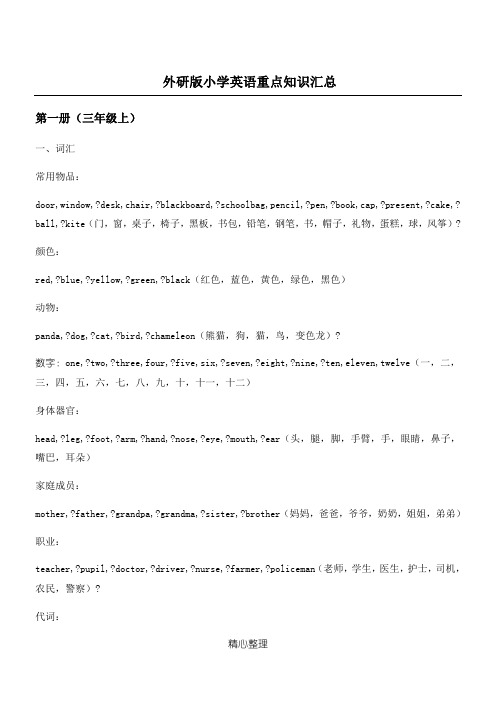
外研版小学英语重点知识汇总第一册(三年级上)一、词汇常用物品:风筝)? 颜色:动物:数字:mother,?father,?grandpa,?grandma,?sister,?brother(妈妈,爸爸,爷爷,奶奶,姐姐,弟弟)职业:teacher,?pupil,?doctor,?driver,?nurse,?farmer,?policeman(老师,学生,医生,护士,司机,农民,警察)?代词:I,?you,?it,?me,?he,?she,?your,?my,?his,?her,?this,?that(我,你,它,我,他,她,你的,我的,他的,她的,这个,那个)?二、句型?1、打招呼及问好:Hello!(你好)??Hi!(你好)Byebye.Thanks!----I’m?fine,?thank?you.(我很好,谢谢你。
)祝别人生日快乐说:Happy?birthday!?(生日快乐!)给别人东西时说:Here’s?your?present.?(给你的礼物。
)2、询问姓名:----What’s?your?name??----I’m?+姓名。
例句:----I’3It’It’例句:It’It’4How?many?+(名词复数)?例句:----How?many?boys??(多少个男孩?)----Twelve?boys.(12个男孩。
)----How?many?red?caps??(多少顶红色的帽子?)----One?red?cap.?(一顶红色的帽子)5、询问年龄:----How?old?are?you??----I’m?+年龄例句:----I’6----It例句:----It----It7This?is?my?+?物/人。
例句:This?is?my?school.(这是我的学校。
)That?is?my?classroom.(那是我的教室。
)This?is?my?English?teacher.?(这是我的英语老师。
外研社版小学六年级英语上学期复习重点

外研社版小学六年级英语上学期复习重点1. 词汇复
- 复常用动词、名词和形容词。
- 复数字、颜色和家庭成员的词汇。
- 复表示时间和日期的词汇。
2. 句式复
- 复基本的句型结构,包括主语+谓语和主谓宾结构。
- 复使用一般现在时和一般过去时表达过去的经历或事件。
- 复使用一般将来时表达将来的计划或打算。
3. 语法复
- 复不定代词的用法,如some, any, no, every等。
- 复形容词的比较级和最高级形式的用法。
- 复名词的复数形式和所有格的表达方式。
4. 听力理解
- 提高对简单句子和常见词汇的听力理解能力。
- 训练听力时要注意听懂问题的意思,并能根据问题内容给出正确的回答。
5. 口语表达
- 复日常生活中常用的问候语和交际用语。
- 练日常对话,如询问身体状况、表达感受、邀请、道歉等。
6. 阅读理解
- 进一步提高阅读理解能力,理解简单的短文内容。
- 练根据短文回答问题,进行判断和选择。
以上是外研社版小学六年级英语上学期的复习重点,希望能够帮到您。
外研版小学英语重点知识汇总(版)
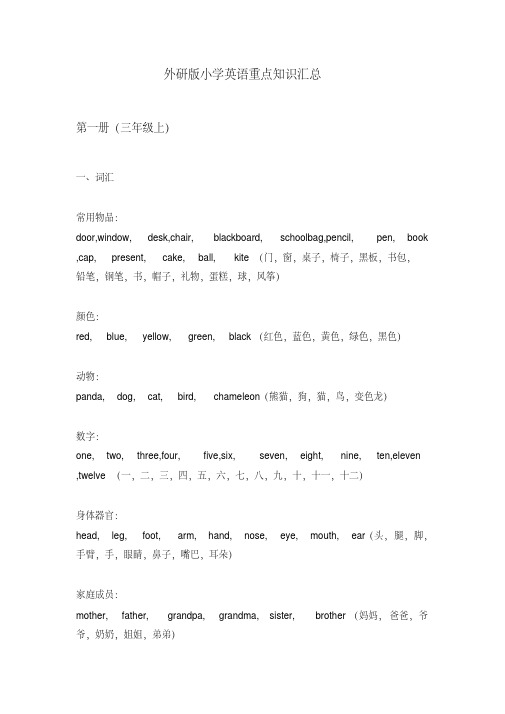
外研版小学英语重点知识汇总第一册(三年级上)一、词汇常用物品:door,window, desk,chair, blackboard, schoolbag,pencil, pen, book ,cap, present, cake, ball, kite(门,窗,桌子,椅子,黑板,书包,铅笔,钢笔,书,帽子,礼物,蛋糕,球,风筝)颜色:red, blue, yellow, green, black(红色,蓝色,黄色,绿色,黑色)动物:panda, dog, cat, bird, chameleon(熊猫,狗,猫,鸟,变色龙)数字:one, two, three,four, five,six, seven, eight, nine, ten,eleven,twelve(一,二,三,四,五,六,七,八,九,十,十一,十二)身体器官:head, leg, foot, arm, hand, nose, eye, mouth, ear(头,腿,脚,手臂,手,眼睛,鼻子,嘴巴,耳朵)家庭成员:mother, father, grandpa, grandma, sister, brother(妈妈,爸爸,爷爷,奶奶,姐姐,弟弟)职业:teacher, pupil, doctor, driver, nurse, farmer, policeman(老师,学生,医生,护士,司机,农民,警察)代词:I, you, it, me, he, she, your, my, his, her, this, that (我,你,它,我,他,她,你的,我的,他的,她的,这个,那个)二、句型1、打招呼及问好:Hello!(你好)Hi!(你好)早上见面说:Good morning.(上午好!)下午见面说:Good afternoon.(下午好!)跟人道别语:Goodbye.(再见)Byebye.(再见)跟人道谢语:Thank you!(谢谢你!)Thanks!(多谢)询问对方的身体情况:----How are you? (你好吗?)----I’m fine, thank you.(我很好,谢谢你。
外研版小学英语~册知识点复习及语法精选版
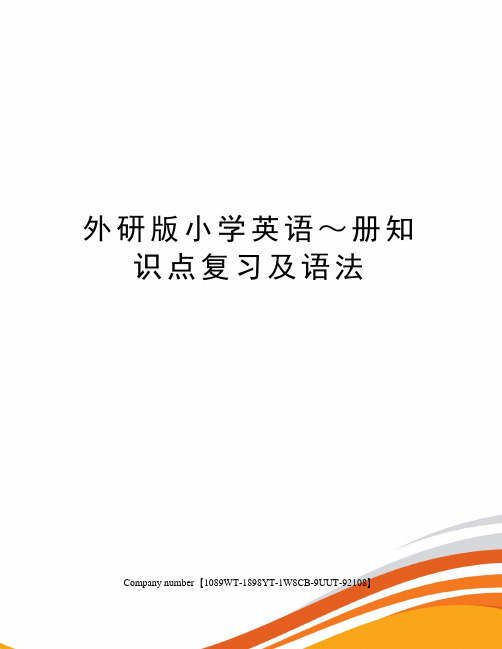
外研版小学英语~册知识点复习及语法Company number【1089WT-1898YT-1W8CB-9UUT-92108】外研版小学英语1~8册知识点复习及语法第1册主要内容1、26个字母(听、说、读、写过关):A B C D E F G H I J K L M N O P Q R S T U V W X Y Za b c d e f g h i j k l m n o p q r s t u v w x y z词汇:boy girl door window blackboard bird desk chair red blue yellow green black dog cat cap panda one two three four five six seven eight nine ten eleven twelve school teacher bag pencil pen book cake kite mother father grandpa grandma sister brother doctor driver policeman nurse farmer head arm leg foot nose eye mouth ear句子:1----Good morning! ----Good morning!2----Good afternoon! ----Good afternoon!3----How are you? ----I’m fine, thank you.4----What’s your name? ----I’m …. / My name is ….----Point to the door/window/blackboard…..----Stand up/ Sit down, please.----What colour… ----It’s red/blue….5----How many … ----One/Two/Three….6----What’s this/that----It’s a chair/desk…----Happy birthday! ----Thank you.---- Here’s your present/cake. ----Thank you.7----How old are you----I’m nine.8----Is it a cat----Yes, it is. / No, it isn’t.----Where’s the cat---I don’t know./ It’s in the green bag.9---- This is my father.----He/She’s a doctor/nurse…. \10---- This is his/ her arm/head….第2册主要内容词汇:song toy car ship doll animal monkey tiger lion elephant big small fat thin tall short sport football basketball table tennis riding bikes swimming skipping meat rice noodles fish milk banana pear orange apple Chinese Maths Science Music Art PE play sleep sing give eat Christmas spring summer autumn winter hot warm cool cold sunny windy dress coat sweater T-shirt bike bus walk in on under park词组:get up go to school have lunch go home watch TVgo to bed have breakfast have dinner Spring Festival New Year fly kites go to work by bus by bike go fishing句子:My favourite toy is a car/ doll….1 ----What’s this/that----It’s a tiger.2 ----What are they------ They’re lions.3 I like/ don’t like football/ basketball….I like/ don’t like swimming/skipping….4----Do you like meat----Yes, I do./ No, I don/t.5----Does Daming/he/ she like bananas-----Yes, he does./ No, she doesn’t.I get up at seven o’clock.----What’s the time, please---- It’s half past seven.----What do you do at the weekend ----- I play football.----What does he/she do at the weekend ---- He/ She watches TV.Happy New Year.It’s spring/ summer/ autumn/ winter.6 ---It’s warm/hot/cool/cold in spring/summer/ autumn/ winter.I’ve got a new book.7----Have you got a new book--- Yes, I have. / No, I haven’t.----Has Tom/he/she got a new book ----Yes, he/she has. / No, he/she hasn’t.8 ---Amy/ He/ She goes to school by bike/ by bus/by car.I t’s in/ on/ under the desk….第3-4册主要内容一、情境问答:第三册1. Have you got_______ Yes, I have. No, I haven’t.2. Excuse me. Where’s the________, please?Go straight on. Turn right. Turn left.3. What are you doing I’m _______What is he/she doing He’s/She’s ___________What are they doing They’re __________4. Do you want some _______ Yes, please. No, thank you.5. Can you _____Yes, I can. No, I can’t.6. What are you going to do I’m/We’re going to _______7. Can I have some ______Yes, you can. Sorry, you can’t.8. How many ____ are there in ____ There is/are______第四册9. Is it _____ Yes, it is. No, it isn’t.10. Will you _____ Yes, I will. No, I won’t.11. Was he/she/it _____ Yes, he/she/it was. No,he/she/it isn’t.Were you ______ Yes, I was. No, I wasn’t.12. Did you/he/she/they____ Yes, I/he/she/they did. No,I/he/she/they didn’t.二、词组短语第三册take pictures watch TV read a book make a cakewrite a letter listen to music talk to my friend do the high jumpplay with in the park look at do the long jumprow a boat under the tree play chessplay football play basketball play table tennis第四册have a picnic go swimming go to the park do homeworkspeak English情景运用:第三册1. 问路、指路Excuse me. Where’s the _______, please?Go straight on. / Turn left. / Turn right.2.询问对方正在做什么What are you doing I’m _______What is he/she doing He’s/She’s ___________What are they doing They’re __________3. 询问对方是否要吃某种食物Do you want some _______ Yes, please. No, thankyou.4. 询问对方的能力Can you _____Yes, I can. No, I can’t.5. 谈论将要做的事情What are you going to do? I’m/We’re going to _________ 6. 向别人要东西吃Can I have some ______Yes, you can. Sorry, you can’t.第四册7. 介绍某人This is_______8. 谈论周一至周日将要做的事What will you do on Monday? I’ll_______ on MondayWill you ______ on MondayYes, I will. No, I won’t.9. 做天气预报It will be hot/cold/sunny/windy. It will snow/rain.10. 做比较如: Sam is older than Daming.第5-6册主要内容e backst Sunday/night/year3.go home4.go to school5.go to the park6.hurry up7.in a hurry8.wait for9.make a list10.shopping list 11.half a kilo 12.how many 13.how much14.at the weekend 15.in the morning 16.in the afternoon17.take a photo18.take photos 19.the British Museum 20.Big Ben 21.the Great Wall22.the London Eye 23.give out 24.be careful 25.too many26.run fast27.play football 28.half past seven 29.get up 30.sitdown31.stand up 32.do morning exercises 33.play chess34.on the farm35.all day 36.of course 37.go out 38.say hello to 39.play basketball40.play table tennis 41.many years ago 42.ten years ago43.three days ago44. live in 45.a lot of=lots of 46.watch TV 47.howabout=what about48.talk about 49.foreign language 50.study/work hard 51.an English teacher52.a Chinese teacher 53.by bus/plane/car/train/ship/bike 54.English/ Chinese food 55.at school /.at home56.at the library57. library card 58.find out 59.be good at 60.look at61.have /has got62. in the east of China 63. in the west of China 64. in the south of China65. in the north of China 66.every year/day 67.send an email68. a good idea 69.listen to 70.be read for句子:1.Did your grandma learn English Yes, she did. /No, shedidn’t.2.What did she have for breakfast She had eggs and sausages.3.Where are the books about… They are on Shelf C.4.When did you go to… I went there in July.5.What about chopsticks It’s a good idea.6.Why don’t you give him a kite?7.8.Did you… Yes, I did. /No, I didn’t.9.When did you come back? We came back last Sunday.10.How many bananas do you want Six, please.11.How much chess do you want Half a kilo.12.Do you like… Yes, I do. /No, I don’t.13.Where did you go? We went to the British Museum.14.What did you do at the weekend We visited lots of places.15.What’s the matter?16.17.Whose bag is this? It’s Ling ling’s.18.Is this your cap Yes, it’s mine.19.There be+ 某物+某地18.Can you… Yes, I can. /No, I can’t.19. What time do you get upI get up at half past six.第7-8册主要内容第七册1.These postcards are great! It’s a picture of the Great Wall.Tell me more about the Great Wall. How long is it?2.3.There’s a Chinatown in New York! There are lots of Chineseshops and restaurants there.4.I’ve got lots of stamps. These are some stamps from Canada.This stamp is from China.5.Thanksgiving is my favourite festival. We always have aspecial meal.6.Can you speak English Can I write to your friend?7.Daming has got a Chinese kite and we fly it in the park. I’vegot some chopsticks, but they are difficult.8.Pandas eat for twelve hours a day.9.Do you often play with dolls Do you often clean your room?10.Do you want to visit the UN building in New York11.12.Don’t talk in the library. Please stand in line.第八册1.What do you want to eat I want a hot dog, please. How much isit2.It’s thirteen dollars and twenty-five cents.3.When are we going to eat We’re going to eat at half pasttwelve. It’s going to snow in Harbin.4.The sun is shining. The birds are singing in the trees. Theducks are eating our picnic.5.Who can help me Sorry, I can’t. I’m making Daming’sbirthday card. I can help you.6.Daming is having a birthday party. Daming is playing thetrumpet, but the phone is ringing.7.I brought you this book. Who gave it to you8.Simon’s family gave it to me.9.Shenzhou V flew into space with Yang Liwei. He spent abouttwenty-one hours in space. He made a video and now he is very famous.10.Helen Keller became blind and deaf. She couldn’t see and shecouldn’t hear. Later she could read and write. She wrote a book about herself.11.What’s the matter12.Why are you laughing13.Why are you wearing a raincoat14.Because it’s going to rain.15.Are you going to go to middle school this September Yes.I’m really excited. What are you going to study16.小学英语语法及习题一、名词复数规则1.一般情况下,直接加-s,如:book-books, bag-bags, cat-cats, bed-beds2.以s. x. sh. ch结尾,加-es,如:bus-buses, box-boxes, brush-brushes, watch-watches3.以“辅音字母+y”结尾,变y为i, 再加-es,如:family-families, strawberry-strawberries4.以“f或fe”结尾,变f或fe为v, 再加-es,如:knife-knives5.不规则名词复数:man-men, woman-women, policeman-policemen, policewoman-policewomen, mouse-micechild-children ,foot-feet, tooth-teeth,fish-fish, people-people, Chinese-Chinese, Japanese-Japanese写出下列各词的复数I _________him _________this ___________her ______watch_______child _______photo ________diary ______day________foot________ book_______ dress ________tooth_______ sheep______box_______ strawberry _____thief _______ peach______ sandwich ______man______ woman_______ paper_______juice___________ water________ milk________ rice__________tea__________二、一般现在时一般现在时基本用法介绍【No. 1】一般现在时的功能1.表示事物或人物的特征、状态。
外研版小学英语语法总复习知识点归纳

外研版小学英语语法总复习知识点归纳一、时态1、一般现在时(1)表示经常发生得动作或事情,通常用“usually通常, often常常, every…每…, sometimes有时,always总就是,”等词。
(2)基本结构:主语I / You / We / They /He / She / It肯定句:主语+ 动词原形或动词第三人称单数形式否定句:主语+ don’t + 动词原形或者doesn’t + 动原一般疑问句(Yes/No) Do… ? Yes, I do、 No,I don’t、Does…(动词原形)…? Yes,he/she does、 No,he/she doesn’t、特殊疑问句What do …? How does she…(动词原形)…?(3) 动词第三人称单数形式(同名词单数变成复数方法相同)1. 一般情况 +s 如:walk-walks2、辅音字母+y结尾去y +ies fly-flies3、结尾就是 s, x, sh, ch +es watch-watches4、结尾就是0 +es do-does, go-goes5、特殊 have-has2.现在进行时(1)表示正在发生得动作,通常用“now现在, look瞧,linsen听”、(2)基本形式: be + 动词-ingeg: I am(not) doing my homework、You/We/They are(not) reading、 He/She/It is(not) eating、What are you doing? Is he reading?(3)动词得现在分词形式(动词+ing)一般情况 +ing walk—walking结尾就是不发音得 e -e + ing e—ing 重读闭音节双写最后一个字母+ing swim-swimming run-running3、一般过去时(1) 表示过去已经发生得事情,通常用“last …上一个…, just now刚才, many years ago许多年前, yesterday昨天”等词。
外研版小学英语一年级起点四年级上册知识点总结

外研版小学英语一年级起点四年级上册知识点总结Module1
1.重点单词
behind在.后面left左边
right右边lost迷路的
street街道,大街supermarket超市cinema电影院
train火车hill小山
house房屋station车站
2.牢记小尾巴
live at居住,住在next to紧靠.旁边at the station在车站
3.重点短语
excuse me打扰一下turn left向左转turn right向右转go straight on直着走up the hil上山down the hill下山near the house在房子附近
4.重点句型
(1)—-Excuse me.Where's the..,please?
打扰一下,请问..在哪儿?
(2)——Thank you so much.十分感谢你。
——You are welcome.
Module2
1.重点单词
run跑步these这些children孩子们China中国
2.重点短语
read a book读书take pictures拍照watch TV看电视play with a toy train玩玩具火车fly a kite放风筝ride a bike骑自行车listen to music听音乐talk to my friend和朋友交谈
3.重点句型
(1)He's taking pictures.他正在拍照。
(2)-What are you doing?你在干什么?
-I'm reading a book.我正在读书。
外研版小学英语语法总复习知识点归纳

外研版小学英语语法总复习知识点归纳一、时态1.一般现在时(1)表示经常发生的动作或事情,通常用“usually通常,often常常,every, 每,,sometimes有时,always总是,”等词。
(2)基本结构:主语I/You/We/They/He/She/It肯定句:主语+动词原形或动词第三人称单数形式否定句:主语+don’t+动词原形或者doesn’t+动原一般疑问句(Yes/No)Do,?Yes,Ido.No,Idon’t.Does,(动词原形),?Yes,he/shedoes.No,he/shedoesn’t.特殊疑问句Whatdo,?Howdoesshe,(动词原形),?(3)动词第三人称单数形式(同名词单数变成复数方法相同)1.一般情况+s如:walk-walks2.辅音字母+y结尾去y+iesfly-flies3.结尾是s,x,sh,ch+eswatch-watches4.结尾是0+esdo-does,go-goes5.特殊have-has2.现在进行时(1)表示正在发生的动作,通常用“now现在,look看,linsen听”.(2)基本形式:be+动词-ingeg:Iam(not)doingmyhomework.You/We/Theyare(not)reading.He/She/Itis(not)eating.Whatareyoudoing?Ishereading?(3)动词的现在分词形式(动词+ing)一般情况+ingwalk—walking结尾是不发音的e-e+ingcome—coming重读闭音节双写最后一个字母+ing swim-swimmingrun-running3.一般过去时(1)表示过去已经发生的事情,通常用“last,上一个,,justnow刚才, manyyearsago许多年前,yesterday昨天”等词。
(2)be动词的过去式:am/is—wasare—were(3)过去式基本结构肯定句:主语+动词过去式Iwentshoppinglastnight.否定句:主语+didn’t+动词原形Ididn’tgoshoppinglastnight.一般疑问句(Yes/No)Did,+动词原形,?Didyougoshoppinglastnight?特殊疑问句(wh-)Whatdid,+动词原形,?Whatdidyoudolastnight?(4)动词过去式的变化:规则动词的变化:(1)一般动词+edplanted,watered,climbed(2)以不发音的e结尾+dlikedtied(3)辅音字母加y结尾-y+iedstudy—studied,cry-cried(4)重读闭音节单词,末尾只有一个辅音字双写最后一个字母+edplan–plannedstop–stopped不规则动词的变化:原形过去式原形过去式原形过去式am/iswasareweregowentdodidfindfoundbuyboughteatatefeelfeltdrinkdrankteachtaughttaketookreadreadgivegavehavehadputputsingsangdrivedrovemeetmetcutcutbeginbeganmakemadeletletringrangwritewroteseesawrunranriderodecomecamedrawdrewsitsattelltoldlearnlearntgetgotcarrycarriedstudystudied4.一般将来时一般将来时表示将来打算做的事或将要发生的事情。
外研英语四年级知识点归纳
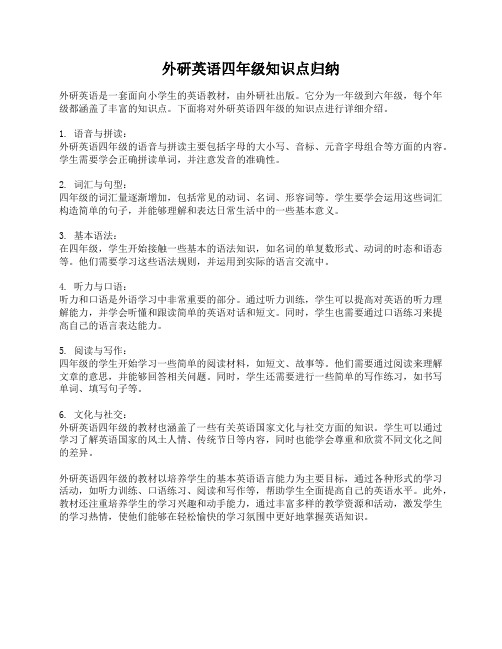
外研英语四年级知识点归纳外研英语是一套面向小学生的英语教材,由外研社出版。
它分为一年级到六年级,每个年级都涵盖了丰富的知识点。
下面将对外研英语四年级的知识点进行详细介绍。
1. 语音与拼读:外研英语四年级的语音与拼读主要包括字母的大小写、音标、元音字母组合等方面的内容。
学生需要学会正确拼读单词,并注意发音的准确性。
2. 词汇与句型:四年级的词汇量逐渐增加,包括常见的动词、名词、形容词等。
学生要学会运用这些词汇构造简单的句子,并能够理解和表达日常生活中的一些基本意义。
3. 基本语法:在四年级,学生开始接触一些基本的语法知识,如名词的单复数形式、动词的时态和语态等。
他们需要学习这些语法规则,并运用到实际的语言交流中。
4. 听力与口语:听力和口语是外语学习中非常重要的部分。
通过听力训练,学生可以提高对英语的听力理解能力,并学会听懂和跟读简单的英语对话和短文。
同时,学生也需要通过口语练习来提高自己的语言表达能力。
5. 阅读与写作:四年级的学生开始学习一些简单的阅读材料,如短文、故事等。
他们需要通过阅读来理解文章的意思,并能够回答相关问题。
同时,学生还需要进行一些简单的写作练习,如书写单词、填写句子等。
6. 文化与社交:外研英语四年级的教材也涵盖了一些有关英语国家文化与社交方面的知识。
学生可以通过学习了解英语国家的风土人情、传统节日等内容,同时也能学会尊重和欣赏不同文化之间的差异。
外研英语四年级的教材以培养学生的基本英语语言能力为主要目标,通过各种形式的学习活动,如听力训练、口语练习、阅读和写作等,帮助学生全面提高自己的英语水平。
此外,教材还注重培养学生的学习兴趣和动手能力,通过丰富多样的教学资源和活动,激发学生的学习热情,使他们能够在轻松愉快的学习氛围中更好地掌握英语知识。
外研版四年级上册英语重点知识

外研版四年级上册英语的重点知识包括以下几个方面:
1. 词汇:掌握并能够运用本册教材中的重点词汇,包括名词、动词、形容词、副词等,能够理解并正确运用这些词汇的基本含义和用法。
2. 语法:掌握并能够运用本册教材中的基本语法知识,包括名词的复数形式、动词的现在进行时、一般现在时等,能够理解并正确运用这些语法规则。
3. 听力和口语:能够听懂并理解本册教材中的对话和短文,能够运用所学的词汇和语法进行简单的口语交流,包括问候、介绍、询问信息等。
4. 阅读和写作:能够阅读并理解本册教材中的短文和对话,能够运用所学的词汇和语法进行简单的写作,包括写日记、写信等。
5. 语音和语调:能够正确发音本册教材中的单词和短语,能够掌握基本的语音和语调规则,能够正确朗读本册教材中的对话和短文。
总之,外研版四年级上册英语的重点知识包括词汇、语法、听力和口语、阅读和写作以及语音和语调等方面,学生需要认真学习和掌握这些知识,以打下良好的英语基础。
外研版小学英语知识点总结

外研版小学英语知识点总结外研版小学英语知识点总结生,靠死记硬背会扼杀了孩子的天性和创造力,科学的学习方法应该是从听、说、玩、演、练,全方位的记忆。
下面是店铺为大家整理的小学必备的英语基础知识,希望对大家有用!小学英语知识重点1. 名词所有格名词如要表示与后面名词的所有关系,通常用名词所有格的形式,意为"……的"。
一般有以下几种形式:(1). 一般情况下在词尾加"'s"。
例如:Kate's father Kate的爸爸my mother's friend 我妈妈的朋友(2). 如果复数名词以s结尾,只加"'"。
例如:Teachers' Day 教师节The boys' game 男孩们的游戏(3). 如果复数名词不以s结尾,仍加"'s"。
例如:Children's Day 儿童节Women's Day 妇女节(4). 表示两个或几个共有时,所有格应加在后一个名词上。
例如:Lucy and Lily's room Lucy 和Lily的房间Kate and Jim's father Kate 和Jim的爸爸动物和无生命事物的名词的所有格一般不在词尾加"'s",而常常用介词of的短语来表示。
a map of China 一幅中国地图the name of her cat 她的猫的名字a picture of my family 我的家庭的一张照片the door of the bedroom 卧室的门2. 祈使句祈使句主要用来表示说话人的请求、命令、建议、叮嘱等意图。
祈使句一般不用主语,读时用降调。
为使语气委婉、礼貌,常在句首或句尾加please 。
在句尾时,please前多用逗号。
(1). 祈使句肯定形式的谓语动词一律用动词原形。
新版外研版五年级下册英语复习要点
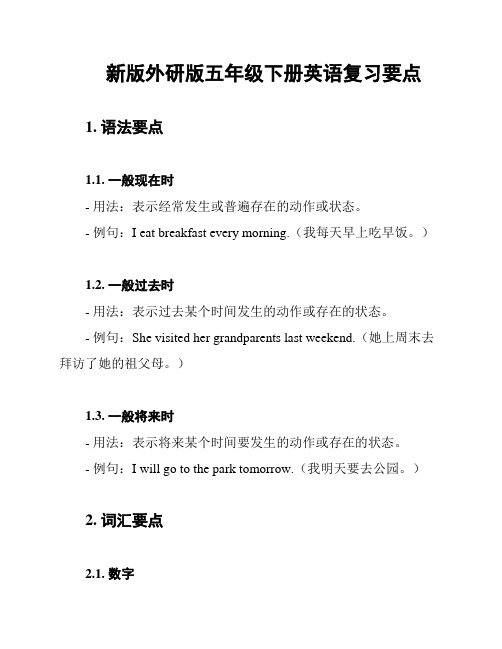
新版外研版五年级下册英语复习要点1. 语法要点1.1. 一般现在时- 用法:表示经常发生或普遍存在的动作或状态。
- 例句:I eat breakfast every morning.(我每天早上吃早饭。
)1.2. 一般过去时- 用法:表示过去某个时间发生的动作或存在的状态。
- 例句:She visited her grandparents last weekend.(她上周末去拜访了她的祖父母。
)1.3. 一般将来时- 用法:表示将来某个时间要发生的动作或存在的状态。
- 例句:I will go to the park tomorrow.(我明天要去公园。
)2. 词汇要点2.1. 数字- 读法:one, two, three, four, five, six, seven, eight, nine, ten, eleven, twelve, thirteen, fourteen, fifteen, sixteen, seventeen, eighteen, nineteen, twenty, thirty, forty, fifty, sixty, seventy, eighty, ninety, one hundred.- 用法:可以用于数数、表示年龄、时间等。
2.2. 家庭成员- 词汇:father, mother, brother, sister, grandfather, grandmother.- 用法:用于描述家庭成员关系。
3. 句型要点3.1. 简单陈述句- 结构:主语 + 谓语 + 宾语。
- 例句:She likes apples.(她喜欢苹果。
)3.2. 疑问句- 结构:疑问词 + 助动词 + 主语 + 谓语 + 其他?- 例句:Where do you live?(你住在哪里?)3.3. 祈使句- 结构:动词原形 + 其他。
- 例句:Open the door.(打开门。
)以上是新版外研版五年级下册英语复习的要点。
外研版小学英语语法总复习完整版

外研版小学英语语法总复习HEN system office room 【HEN16H-HENS2AHENS8Q8-HENH1688】小学英语语法总复习一、时态1.一般现在时(1)表示经常发生的动作或事情,通常用“usually通常, often常常, every…每…, sometimes有时,always总是,”等词。
(2)基本结构:(3) 动词第三人称单数形式(同名词单数变成复数方法相同)2.现在进行时(1)表示正在发生的动作,通常用“now现在, look看,listen听”.(2)基本形式: be + 动词ingeg: I am(not) doing my homework.You/We/They are(not) reading.He/She/It is(not) eating.What are you doing?Is he reading?(3)动词的现在分词形式(动词+ing)3. 一般过去时(1)表示过去已经发生的事情,通常用“last …上一个…, just now刚才, a moment ago刚才, yesterday昨天”等词。
(2)be 动词的过去式: am/is—was;are—were(3)过去式基本结构(4)词过去式的变化:规则动词的变化:不规则动词的变化:原形过去式原形过去式原形过去式原形过去式sweep swept teach taught have had go wentkeep kept think thought do did find found sleep slept buy bought eat ate say saidfeel felt drink drank is/am was take tookread read give gave are were mean meantput put sing sang drive drove meet metcut cut begin began speak spoke make madelet let ring rang write wrote see sawfly flew run ran ride rode come came draw drew sit sat hear heard tell toldgrow grew learn learned/learntget got know knew4.一般将来时一般将来时表示将来打算做的事或将要发生的事情。
外研版小学英语语法总复习知识点归纳
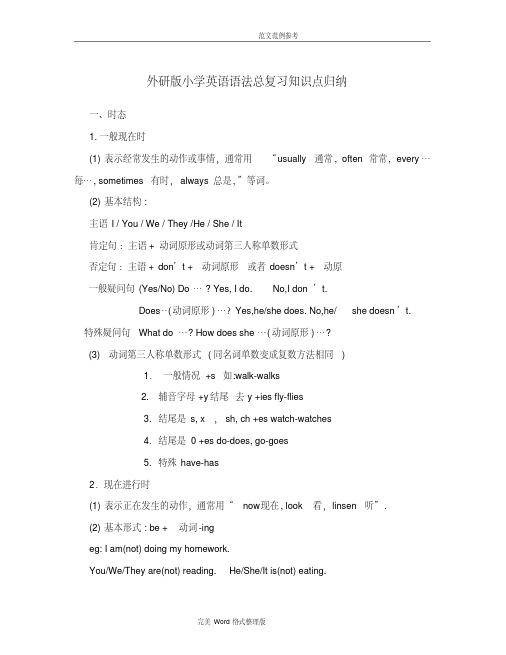
外研版小学英语语法总复习知识点归纳一、时态1.一般现在时(1)表示经常发生的动作或事情,通常用“usually通常, often常常, every…每…, sometimes有时,always总是,”等词。
(2)基本结构:主语I / You / We / They /He / She / It肯定句:主语+ 动词原形或动词第三人称单数形式否定句:主语+ don’t + 动词原形或者doesn’t + 动原一般疑问句(Yes/No) Do… ? Yes, I do. No,I don’t.Does…(动词原形)…? Yes,he/she does. No,he/she doesn’t.特殊疑问句What do …? How does she…(动词原形)…?(3) 动词第三人称单数形式(同名词单数变成复数方法相同)1.一般情况 +s 如:walk-walks2. 辅音字母+y结尾去y +ies fly-flies3. 结尾是 s, x, sh, ch +es watch-watches4. 结尾是0 +es do-does, go-goes5. 特殊 have-has2.现在进行时(1)表示正在发生的动作,通常用“now现在, look看,linsen听”.(2)基本形式: be + 动词-ingeg: I am(not) doing my homework.You/We/They are(not) reading. He/She/It is(not) eating.What are you doing? Is he reading?(3)动词的现在分词形式(动词+ing)一般情况 +ing walk—walking结尾是不发音的 e -e + ing come—coming 重读闭音节双写最后一个字母+ing swim-swimming run-running3. 一般过去时(1) 表示过去已经发生的事情,通常用“last …上一个…, just now刚才, many years ago许多年前, yesterday昨天”等词。
五上英语外研版第一二单元重点知识

以下是五年级上册英语外研版第一、二单元的重点知识总结第一单元:我的新老师一、词汇科目词汇:1.Chinese 语文2.Maths 数学3.English 英语4.Science 科学5.PE 体育6.Music 音乐7.Art 美术描述词汇:1.strict 严格的2.kind 和蔼的/亲切的3.funny 有趣的4.clever 聪明的5.shy 害羞的6.句子中的其他词汇:7.sometimes 有时8.cool 酷的9.speak 说/讲(某种语言)10.h elp 帮助11.f inish 完成/做好12.p hone 打电话/电话13.a t 在......(点钟)14.w ho’s = who is 是谁二、句型1.询问某科的老师是谁:2.Who’s your [subject] teacher?3.你的[某科目]老师是谁?4.描述老师的特点:5.[Name] is our [subject] teacher. [He/She] is [adjective].6.[名字]是我们的[某科目]老师。
他/她是[形容词]。
7.询问某人是否懂某种语言:8.Does [he/she] speak [language]?9.他/她说[某种语言]吗?10.询问某人的喜好:11.W hat’s [he/she] like?12.他/她怎么样?13.表达某人有时做某事:14.[He/She] sometimes [action].15.他/她有时[做某事]。
16.询问某人是否完成某事:17.D o you finish your homework?18.你完成作业了吗?19.表达某人正在帮助某人做某事:20.[Name] is helping [other name] [action].21.[名字]正在帮助[另一个人名字][做某事]。
22.打电话的用语:23.T his is [name] speaking. 我是[名字]。
外研版三年级英语知识点归纳
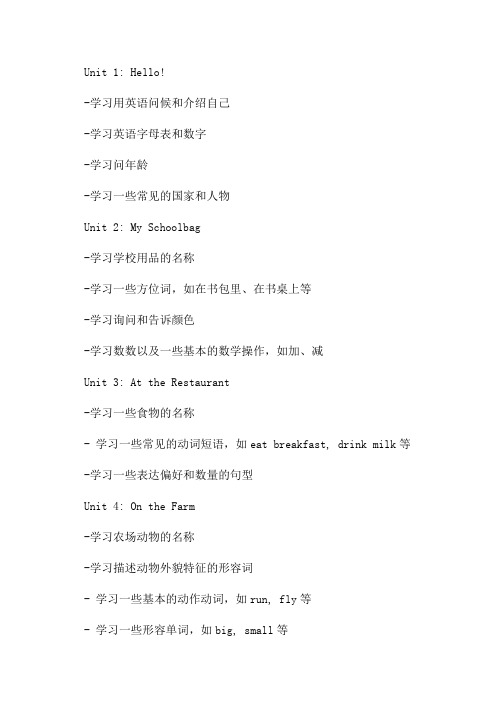
Unit 1: Hello!-学习用英语问候和介绍自己-学习英语字母表和数字-学习问年龄-学习一些常见的国家和人物Unit 2: My Schoolbag-学习学校用品的名称-学习一些方位词,如在书包里、在书桌上等-学习询问和告诉颜色-学习数数以及一些基本的数学操作,如加、减Unit 3: At the Restaurant-学习一些食物的名称- 学习一些常见的动词短语,如eat breakfast, drink milk等-学习一些表达偏好和数量的句型Unit 4: On the Farm-学习农场动物的名称-学习描述动物外貌特征的形容词- 学习一些基本的动作动词,如run, fly等- 学习一些形容单词,如big, small等Unit 5: At the Zoo-学习动物园动物的名称-学习描述动物行为的短语- 学习一些数字表达方式,如one dog, two cats等- 学习一些形容词来描述动物的性格,如friendly, shy等Unit 6: Sports Day-学习一些常见的体育项目的名称-学习一些询问和回答关于兴趣爱好的句型- 学习一些时间状语词,如in the morning, in the afternoon等- 学习一些单词来表达赞美和鼓励,如good, great等除了以上的主题知识点,外研版三年级英语还包含其他一些基础知识,如对话交际、阅读理解、语法规则等。
学生通过教材中的对话练习,提高了听力和口语能力;通过阅读和理解故事,提升了阅读能力;通过语法和词汇练习,掌握了一些基本的语法规则和词汇。
这些知识点的学习不仅在学生的日常生活中有很好的应用价值,也为将来学习更高级的英语打下了坚实的基础。
因此,外研版三年级英语教材提供了全面而有趣的学习内容,让学生在愉快的学习中提高了英语水平。
外研版小学三至六年级英语语法及重点副词

外研版小学三至六年级英语语法及重点副
词
本文档旨在介绍外研版小学三至六年级英语语法及重点副词。
以下是各年级的语法内容和重点副词的总结:
三年级
语法
- 一般现在时:表示经常性或惯性的动作或状态。
- 基数词:表示数量的词,用来数数。
重点副词
- often:经常地
- sometimes:有时地
- always:总是
- usually:通常地
四年级
语法
- 简单过去时:表示过去发生的动作或状态。
- 比较级:表示两个或多个人或物之间的比较。
- 不规则动词:过去式形式不规则的动词。
重点副词
- yesterday:昨天
- last week:上个星期
- more:更多地
- less:更少地
五年级
语法
- 现在进行时:表示此时此刻正在进行的动作。
- 一般将来时:表示将来要发生的动作或状态。
- 介词短语:由介词、名词或代词构成的短语。
重点副词
- now:现在
- tomorrow:明天
- next month:下个月
- there:那里
六年级
语法
- 定冠词:表示特指的名词前的冠词。
- 不定冠词:表示泛指的名词前的冠词。
- 情态动词:表示说话人的态度、意愿、推测或建议等。
重点副词
- here:这里
- anywhere:任何地方
- should:应该
- must:必须
以上为外研版小学三至六年级英语语法及重点副词的概述。
更多详细的语法规则和副词用法请参考相应的教材或学习资源。
外研版小学英语知识点归纳.docx
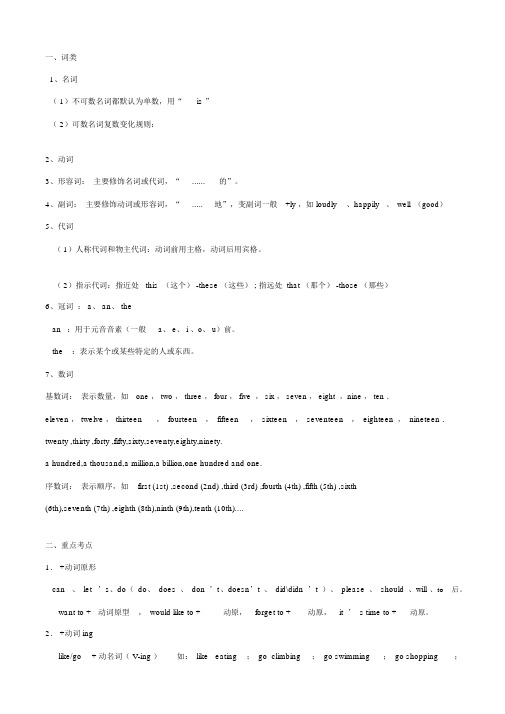
1、名词( 1)不可数名词都默认为单数,用“is ”( 2)可数名词复数变化规则:2、动词3、形容词:主要修饰名词或代词,“......的”。
4、副词:主要修饰动词或形容词,“.....地”,变副词一般+ly ,如 loudly、happily、well(good)5、代词(1)人称代词和物主代词:动词前用主格,动词后用宾格。
(2)指示代词:指近处 this (这个) -these (这些) ; 指远处 that (那个) -those (那些)6、冠词: a、 an、 thean:用于元音音素(一般a、 e、 i 、o、 u)前。
the:表示某个或某些特定的人或东西。
7、数词基数词:表示数量,如one , two , three , four , five , six , seven , eight ,nine , ten .eleven , twelve , thirteen,fourteen,fifteen,sixteen,seventeen,eighteen,nineteen.twenty ,thirty ,forty ,fifty,sixty,seventy,eighty,ninety.a hundred,a thousand,a million,a billion,one hundred and one.序数词:表示顺序,如first (1st) ,second (2nd) ,third (3rd) ,fourth (4th) ,fifth (5th) ,sixth(6th),seventh (7th) ,eighth (8th),ninth (9th),tenth (10th)....二、重点考点1. +动词原形can、let’s、do(do、does、don’t、doesn’t、did\didn’t)、please、should、will、to后。
want to +动词原型,would like to +动原,forget to +动原,it’ s time to +动原。
- 1、下载文档前请自行甄别文档内容的完整性,平台不提供额外的编辑、内容补充、找答案等附加服务。
- 2、"仅部分预览"的文档,不可在线预览部分如存在完整性等问题,可反馈申请退款(可完整预览的文档不适用该条件!)。
- 3、如文档侵犯您的权益,请联系客服反馈,我们会尽快为您处理(人工客服工作时间:9:00-18:30)。
外研版小学英语复习的重点外研版小学英语复习的重点词汇和句型一、分类词汇名词:人物boy girl mother father brother sister friend cousin driver dancer pupil teacher policeman nurse farmer doctor Ms Mr动物animal dragon tiger lion elephant monkey panda dog cat bird 五官身体部分head eye nose ear mouth hand arm foot leg hair食物food cake rice meat bread noodles soup fish chocolate mango banana apple pear orange peanut sweets biscuit vegetable milk fruit watermelon ice cheese juice coffee tea场所方位classroom class school home farm house road supermarket station park lake sea rivereast west north south国家China England America country交通工具bike bus train boat plane学科English, Chinese, Math, Science玩具kite, toy, computer game, doll,jigsaw, chess, ball文具bag pencil pen book时间time today day hour yesterday tomorrow morning afternoon evening weekend spring summer autumn winter January February March April May June July August September October NovemberDecember Monday Tuesday Wednesday Thursday Friday Saturday Sunday服装hat dress coat T-shirt clothes sweater教室中的物品desk chair door window其它名词name present box bottle song winner Christmas tree letter metre kilo homework robot weather postcard matter game life radio Cold headache fever动词:运动play football, play basketball, play table tennis, do morning exercises, go swimming, go cycling, run, high jump, ride, row a boat, 系动词am is are was were feel smell情态动词can need may should其它动作want, make, cook, wash, please, draw, thank, think, point to, sit down, stand up, know, help, hope, look see, have, has, like, sing , read, write, draw, learn, listen, hear, say, talk, tell, study, speak, drink, drop laugh, give, visit, catch, dance, carry, live, agree, stop, finish, wait, get up, have breakfast, go to school, go to work, have lunch, go home, have dinner, watch TV, take pictures, go straight on, turn right, turn left, understand, argue, wear,went bought had met ran lost learnt形容词:颜色red blue yellow green black orange purple pink white天气hot cold warm cool windy sunny心情感觉fine, happy, favorite, hungry, difficult, thirsty sad, bored, angry, tired, sorry其它big small short tall old young new thin fat, great, strong, blind, deafnice shy clever naughty cool cute good bad carefullong wide interesting beautiful wonderful many much famous quiet dangerousbetter, worse, useful, last dear clean enough副词:疑问副词where when how why其它副词here there now then very up down fast high well badly really hard代词:人称代词I we you he she they it物主代词my our your his her their its mine yours hers his指示代词this that these those不定代词some many much any疑问代词what, whose, How many, How old, who, How much,数词one two three four five six seven eight nine ten eleven twelve thirteen fourteen fifteen sixteen seventeen eighteen nineteen twenty thirty forty fifty sixty seventy eighty ninety hundred介词:on in under to at past by with冠词:a an the连词:and, but, because, so, than其它:Yes, No, Hello, Goodbye, Thank you, too, Happy birthday, o’clock, Happy New Year, Spring Festival, Children’s Day, Let’s, Excuse me, Sport Day, Good luck, Come on, Of course, The Great Wall,二、重点句型1. Good morning.2. Good afternoon.3. How are you?I’m fine, thank you.And how are you?I’m fine, too.4. What’s your name?My name is Sam. / I’m Sam.5. How many? It’s ten.6. How many boys? Ten boys.7. How many girls? Eleven girls.8. Stand up/ Sit down.9. Point to the door. /window, chair…10. What’s this?It’s a book.11. What’s that?It’s a chair.12. Happy birthday. Thank you.13. Where’s my present?It’s in the hatIt’s on the hat.It’s under the hat.14. How old are you?I’m e leven.15. Is it a dog?Yes, it is./ No, it isn’t..16. This is my mother.She’s a teacher.This is my father.He’s a doctor.This is my grandpa.He’s a policeman.This is my grandma.She’s a driver.This is my brother.He’s a farmer.This is my sister.Sh e’s a nurse.It’s me.I’m a pupil.17. This is my hand. This is my nose.This is my mouth. These are my eyes. These are my ears. These are my feet.18. What are they? They are monkeys.Are they tall?No, they aren’t.Are they thin?Yes, they are.19.I like football.I don’t like basketball.I like swimming.I don’t like skipping rope.I like skipping rope.I don’t like cycling.20.What’s your favourite colour? It’s blue.21. Sam likes toy cars.He doesn’t like Barbie dolls.22. Amy likes Barbie dolls.She d oesn’t like computer games 23. Do you like noodles?Yes, I do. / No, I don’t.24. Does Lingling like meat?Yes, she does. / No, she doesn’t. 25. What’s the time, please?It’s four o’clock.It’s half past three.26. I have breakfast at six o’clock.I go to school at eight o’clock.I have lunch at twelve o’clock.I go home at half past five.I have dinner at half past six.27. What do you do at the weekend?I play basketball.I watch TV.I play football.I play table tennis.I go swimming.28. What does Sam do at the weekend?He plays basketball.He watches TV.He plays football.He plays table tennis.He goes swimming.29. What does Amy do at the weekend?She plays basketball.She watchesTV.She plays football.She plays table tennis.She goes swimming.30. What do you have at school?At school I have Chinese, Maths, English and Science.31. Happy New Year.32. Happy Christmas.33. SpringIt’s spring.It’s warm in spring.We go cycling in spring.34. SummerIt’s summer.It’s hot in summer.We go swimming in summer.35. AutumnIt’s autumn.It’s cool in autumn.We play football in autumn.36. WinterIt’s winter.It’s cold in winter.We watch TV and play table tennis in winter.37. What do you do in spring?I go cycling in spring.What do you do in summer?I go swimming in summer.What do you do in autumn?I play football in autumn.What do you do in winter?I watch TV and play table tennis in winter.38. How do you go to school?I go to school by bus.(或by train, by car, by bike)I go to school on foot.I walk to school.39. How does your father go to work?He goes to work by car.How does your mother go to work?She goes to work by bike.40. Have you got a tiger?Yes, I have. / No, I haven’t.Have you got a new sweater?Yes, I have. / No, I haven’t.41. Has he got a new toy plane?Yes, he has. / No, he hasn’t.Has she got a new dress?Yes, she has. / No, she hasn’t.42. This is my mother. She’s watching TV.This is my father. He’s reading a book.This is my grandma. She’s writing a letter. This is my grandpa. He’s taking a picture.43. What are you doing?I’m watching TV.44. Do you want some rice?Yes, please. / No, thank you.45. Have you got chopsticks in England?Yes, we have./ No, we haven’t.45. What are they doing?They’re rowing a boat.46. Can you jump far? (run fast, jump high, ride fast) Yes, I can. / No, I can’t.46. It’s time to go to bed.47. We’re going to go to Hainan tomorrow.48. What are you going to do for Sports Day?I’m going to run 100 metres.49. Can I have an apple?Yes, you can. / Sorry, you can’t.50. Can I have some soup?Yes, you can. / Sorry, you can’t.51. There is some fish.(不可数名词)There are some sweets. (可数名词)There isn’t any soup. (不可数名词)There aren’t any biscuits. (可数名词)52. How many birthdays are there in January?There is one. Ther e four. There aren’t any.53. This is Xiaoyong. He’s a clever pupil. He’s very clever.54. This is a book about London. It’s very nice.55. London is the capital of England.56. This the River Thames. It’s very long and very wide.57. This is Big Ben. It’s very old and very tall.58. This is Hyde Park. It’s very beautiful.59. This is Tower Bridge. It’s very famous and very beautiful.60. We’re going to have a picnic.61. Will you take a ball?Yes, I will. / No, I won’t.63.What is Amy doing?She’s reading a letter.64. I like playing football.65. I love watching TV.66. I like football and watching TV.67. Robots will do everything.68. Robots can walk.69. It will be windy in Beijing.70. It will rain in Hanzhou.71. Amy’s taller than Lingling.72. I’m sh orter than Daming.73. Beijing is bigger than Tianjin.74. I think this girl is better than the first girl.75. Do you agree?76. This boy is worse than that boy.77. Washington D.C is the capital of the USA.78. People speak English in America.79. I was two then. Now I am ten.80. He was two then. Now he’s ten.81. They weren’t old then. They were very young.82. Did you help your mother on Saturday? Yes, I did. / No, I didn’t.83. Did Amy help her mother? Yes, she did. / No, she didn’t.84. Did Daming go to school? Yes, he did. / No, he didn’t.85. Where did you go? I went to the Great Wall.86. What did you do yesterday? I played basketball.87. What did you see? I saw some big mountains.88. What did you eat? I ate some bread.89. What did you buy? I bought some pictures.90. Sam had chocolate biscuits yesterday. Today he’s got a stomachache.91. Amy had a cold yesterday. Today she’s got a headache.92. Lingling had a headache yesterday. Today she’s got a fever.93. I’ve got a fever.94. There was a tree.95. There were many trees.96. There wasn’t a chair.97. There weren’t many flowers.98. How many bananas do you want? Five bananas, please.99. How much cheese do you want? Half a kilo, please.100. It was sunny, so we could play basketball.101. It rained yesterday, so sh e couldn’t play basketball.102. Is this your cap? Yes, it’s mine./ No, it isn’t. It’s hers.103. Whose book is this? It’s hers.104. There is too much rubbish.There aren’t enough sun.There are too many chickens.There isn’t enough f ood.There are too many children.There aren’t enough chairs.105. I can play football well.106. Can you control the ball?Yes, I can. / No, I c外研版小学英语复习的重点词汇和句型一、分类词汇名词:人物boy girl mother father brother sister friend cousin driver dancer pupil teacher policeman nurse farmer doctor Ms Mr动物animal dragon tiger lion elephant monkey panda dog cat bird五官身体部分head eye nose ear mouth hand arm foot leg hair食物food cake rice meat bread noodles soup fish chocolate mango banana apple pear orange peanut sweets biscuit vegetable milk fruit watermelon ice cheese juice coffee tea场所方位classroom class school home farm house road supermarket station park lake sea rivereast west north south国家China England America country交通工具bike bus train boat plane学科English, Chinese, Math, Science玩具kite, toy, computer game, doll,jigsaw, chess, ball文具bag pencil pen book时间time today day hour yesterday tomorrow morning afternoon evening weekend spring summer autumn winter January February March April May June July August September October November December Monday Tuesday Wednesday Thursday Friday Saturday Sunday服装hat dress coat T-shirt clothes sweater教室中的物品desk chair door window其它名词name present box bottle song winner Christmas tree letter metre kilo homework robot weather postcard matter game life radioCold headache fever动词:运动play football, play basketball, play table tennis, do morning exercises, go swimming, go cycling, run, high jump, ride, row a boat, 系动词am is are was were feel smell情态动词can need may should其它动作want, make, cook, wash, please, draw, thank, think, point to, sit down, stand up, know, help, hope, look see, have, has, like, sing , read, write, draw, learn, listen, hear, say, talk, tell, study, speak, drink, drop laugh, give, visit, catch, dance, carry, live, agree, stop, finish, wait, get up, have breakfast, go to school, go to work, have lunch, go home, have dinner, watch TV, take pictures, go straight on, turn right, turn left, understand, argue, wear,went bought had met ran lost learnt形容词:颜色red blue yellow green black orange purple pink white天气hot cold warm cool windy sunny心情感觉fine, happy, favorite, hungry, difficult, thirsty sad, bored, angry, tired, sorry其它big small short tall old young new thin fat, great, strong, blind, deafnice shy clever naughty cool cute good bad carefullong wide interesting beautiful wonderful many much famous quiet dangerousbetter, worse, useful, last dear clean enough副词:疑问副词where when how why其它副词here there now then very up down fast high well badly really hard代词:人称代词I we you he she they it物主代词my our your his her their its mine yours hers his指示代词this that these those不定代词some many much any疑问代词what, whose, How many, How old, who, How much,数词one two three four five six seven eight nine ten eleven twelve thirteen fourteen fifteen sixteen seventeen eighteen nineteen twenty thirty forty fifty sixty seventy eighty ninety hundred介词:on in under to at past by with冠词:a an the连词:and, but, because, so, than其它:Yes, No, Hello, Goodbye, Thank you, too, Happy birthday, o’clock, Happy New Year, Spring Festival, Children’s Day, Let’s, Excuse me, Sport Day, Good luck, Come on, Of course, The GreatWall,二、重点句型1. Good morning.2. Good afternoon.3. How are you?I’m fine, thank you.And how are you?I’m fine, too.4. What’s your name?My name is Sam. / I’m Sam.5. How many? It’s ten.6. How many boys? Ten boys.7. How many girls? Eleven girls.8. Stand up/ Sit down.9. Point to the door. /window, chair…10. What’s this?It’s a book.11. What’s that?It’s a chair.12. Happy birthday. Thank you.13. Where’s my present ?It’s in the hatIt’s on the hat.It’s under the hat. 14. How old are you? I’m eleven.15. Is it a dog? Yes, it is./ No, it isn’t..16. This is my mother. She’s a teacher.This is my father. He’s a docto r.This is my grandpa. He’s a policeman. This is my grandma. She’s a driver.This is my brother. He’s a farmer.This is my sister. She’s a nurse.It’s me.I’m a pupil.17. This is my hand. This is my nose.This is my mouth.These are my eyes.These are my ears.These are my feet.18. What are they?They are monkeys.Are they tall?No, they aren’t.Are they thin?Yes, they are.19. I like football.I don’t like basketball.I like swimming.I don’t like skipping rope.I like skipping rope.I don’t like cyclin g.20.What’s your favourite colour? It’s blue.21. Sam likes toy cars.He doesn’t like Barbie dolls.22. Amy likes Barbie dolls.She doesn’t like computer games23. Do you like noodles?Yes, I do. / No, I don’t.24. Does Lingling like meat?Yes, she does. / No, she doesn’t.25. What’s the time, please?It’s four o’clock.It’s half past three.26. I have breakfast at six o’clock.I go to school at eight o’clock.I have lunch at twelve o’clock.I go home at half past five.I have dinner at half past six.27. What do you do at the weekend?I play basketball.I watch TV.I play football.I play table tennis.I go swimming.28. What does Sam do at the weekend? He plays basketball.He watches TV.He plays football.He plays table tennis.He goes swimming.29. What does Amy do at the weekend?She plays basketball.She watchesTV.She plays football.She plays table tennis.She goes swimming.30. What do you have at school?At school I have Chinese, Maths, English and Science.31. Happy New Year.32. Happy Christmas.33. SpringIt’s spring.It’s warm in spring.We go cycling in spring.34. SummerIt’s summer.It’s hot in summer.We go swimming in summer.35. AutumnIt’s autumn.It’s cool in autumn.We play football in autumn.36. WinterIt’s winter.It’s cold in winter.We watch TV and play table tennis in winter.37. What do you do in spring?I go cycling in spring.What do you do in summer?I go swimming in summer.What do you do in autumn?I play football in autumn.What do you do in winter?I watch TV and play table tennis in winter.38. How do you go to school?I go to school by bus.(或by train, by car, by bike) I go to school on foot.I walk to school.39. How does your father go to work?He goes to work by car.How does your mother go to work?She goes to work by bike.40. Have you got a tiger?Yes, I have. / No, I haven’t.Have you got a new sweater?Yes, I have. / No, I haven’t.41. Has he got a new toy plane?Yes, he has. / No, he hasn’t.Has she got a new dress?Yes, she has. / No, she hasn’t.42. This is my mo ther. She’s watching TV.This is my father. He’s reading a book.This is my grandma. She’s writing a letter. This is my grandpa. He’s taking a picture.43. What are you doing?I’m watching TV.44. Do you want some rice?Yes, please. / No, thank you.45. Have you got chopsticks in England?Yes, we have. / No, we haven’t.45. What are they doing?They’re rowing a boat.46. Can you jump far?(run fast, jump high, ride fast)Yes, I can./ No, I can’t.46. It’s time to go to bed.47. We’re going to go to Hainan to morrow.48. What are you going to do for Sports Day?I’m going to run 100 metres.49. Can I have an apple?Yes, you can. / Sorry, you can’t.50. Can I have some soup?Yes, you can. / Sorry, you can’t.51. There is some fish.(不可数名词)There are some sweets. (可数名词)There isn’t any soup. (不可数名词)There aren’t any biscuits. (可数名词)52. How many birthdays are there in January?There is one. There four. There aren’t any.53. This is Xiaoyong. He’s a clever pupil. He’s very clever.54. This is a book about London. It’s very nice.55. London is the capital of England.56. This the River Thames. It’s very long and very wide.57. This is Big Ben. It’s very old and very tall.58. This is Hyde Park. It’s very beautiful.59. This is Tower Bridge. It’s very famous and very be autiful.60. We’re going to have a picnic.61. Will you take a ball?Yes, I will. / No, I won’t.63.What is Amy doing?She’s reading a letter.64. I like playing football.65. I love watching TV.66. I like football and watching TV.67. Robots will do everything.68. Robots can walk.69. It will be windy in Beijing.70. It will rain in Hanzhou.71. Amy’s taller than Lingling.72. I’m shorter than Daming.73. Beijing is bigger than Tianjin.74. I think this girl is better than the first girl.75. Do you agree?76. This boy is worse than that boy.77. Washington D.C is the capital of the USA.78. People speak English in America.79. I was two then. Now I am ten.80. He was two then. Now he’s ten.81. They weren’t old then. They were very young.82. Did you hel p your mother on Saturday? Yes, I did. / No, I didn’t.83. Did Amy help her mother? Yes, she did. / No, she didn’t.84. Did Daming go to school? Yes, he did. / No, he didn’t.85. Where did you go? I went to the Great Wall.86. What did you do yesterday? I played basketball.87. What did you see? I saw some big mountains.88. What did you eat? I ate some bread.89. What did you buy? I bought some pictures.90. Sam had chocolate biscuits yesterday. Today he’s got a stomachache.91. Amy had a cold yesterday. T oday she’s got a headache.92. Lingling had a headache yesterday. Today she’s got a fever.93. I’ve got a fever.94. There was a tree.95. There were many trees.96. There wasn’t a chair.97. There weren’t many flowers.98. How many bananas do you want? Five bananas, please.99. How much cheese do you want? Half a kilo, please.100. It was sunny, so we could play basketball.101. It rained yesterday, so se couldn’t play basketball.102. Is this your cap? Yes, it’s mine./ No, it isn’t. It’s hers.103. Whos e book is this? It’s hers.104. There is too much rubbish.There aren’t enough sun.There are too many chickens.There isn’t enough food.There are too many children.There aren’t enough chairs.105.I can play football well.106. Can you control the ball?Yes, I can. / No, I can’t.107. This man is blind. He cannot see. He cannot walk well by himself. This dog helps him.108. This girl is deaf. She cannot hear well by herself. This dog helps her.109. These firemen cannot find people by themselves. But these dogs help them.110. What time do you get up? I get up at half past six.111. Are you feeling happy? Yes, I am. / No, I’m not.112. Y ou should look. Then cross the road.113. Y ou shouldn’t walk in the road.114. Should he do his homework? Yes, she should.115. Should she watch TV? No, she shouldn’t.。
